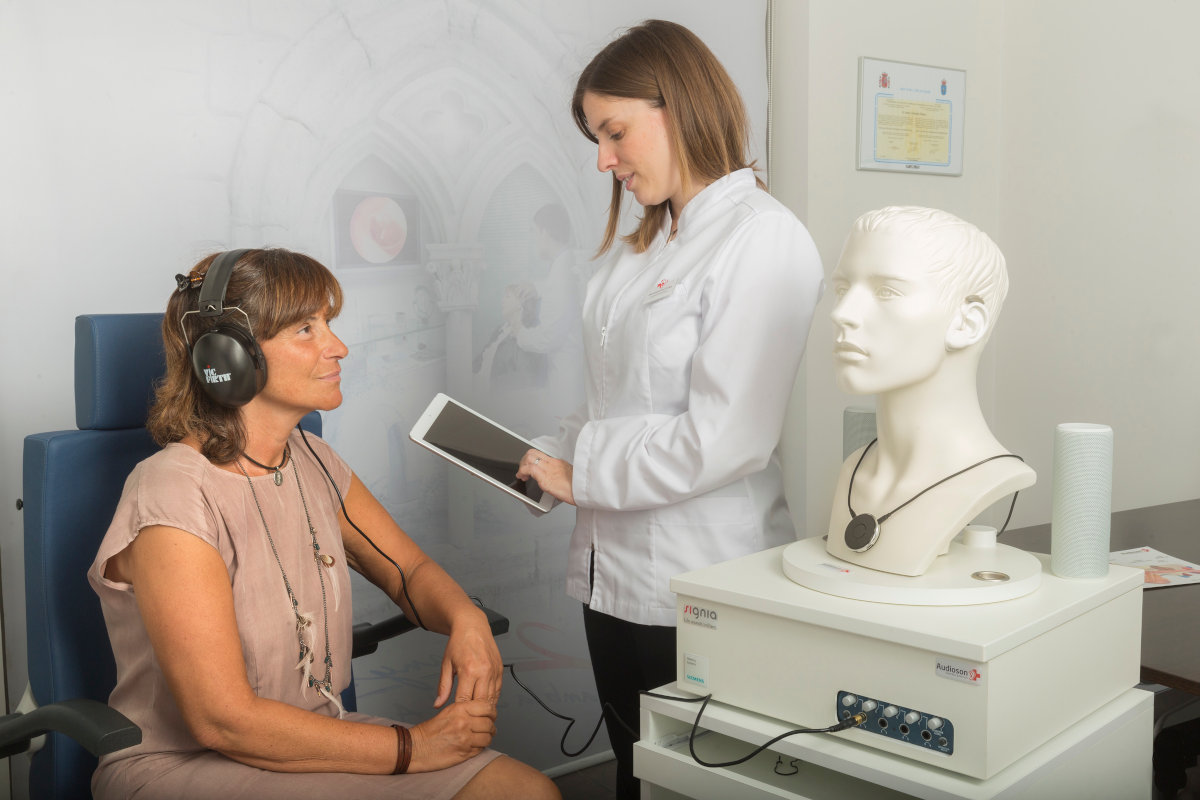Identifying hearing loss
We must be aware of the symptoms which indicate that people around us, family or friends, are losing their hearing. This is important because in this way they can take action as soon as possible and we contribute to improve the quality of their lives.
Symptoms that indicate that a person is losing hearing:
· In a conversation, they look more at the movement of the lips than at the eyes of the person who is talking to them.
· It is difficult for them to follow the thread of a conversation, particularly if there is a lot of background noise or if more than one person speaks at the same time.
· They frequently ask for repetition of words.
· They need to turn up the TV more than normal.
· Sometimes, when the telephone rings, if they are far, they don’t hear it, etc.
Why do we lose our hearing?
Inside our ears we have little cells called hair cells. These cells are in charge of sound transmission. They may be harmed by illnesses, injuries, wear, noise exposure or hereditary factors. If this is the case and they are affected, the sound impulses sent to the brain will be distorted or insufficient. The first type of affected frequencies are high frequencies, which implies difficulties to understand high frequency sounds or soft sounds.
Dangers of not hearing properly
What type of dangers can we face if we don’t treat our hearing loss?
Danger:
We won’t know where the sounds are coming from: if we don’t hear properly, it is very difficult to recognise the source of the sounds and this may lead to dangerous situations, for example when we cross the street and don’t realise that a car is approaching and we don’t hear the sound of the engine either, or in case we hear it approaching, we don’t know which side it comes from.
If the ear is not stimulated, it becomes inactive:
Our ears must work. They must be stimulated by using a hearing aid, otherwise, they become lazy and there is a further loss of hearing.
Overexertion and Stress:
If we don’t hear properly, the effort we make to understand what other people say is bigger. This is exhausting and stressful. In the long run, we avoid participating in conversations which ends up isolating us.
Physical and mental health:
Researchers from Johns Hopkins University and from the National Institute on Aging in United States have discovered that hearing loss accelerates brain tissue reduction that is normally produced by the aging process. Disappearance of brain tissue could be related to the first stages of Mild Cognitive Impairment and Alzheimer. Hearing loss therefore is associated with a decrease in physical and mental health.
How to convince them
It is difficult for people who suffer from hearing loss to admit that they have hearing difficulties. As it is a gradual loss, they get used to not hearing many sounds and think that this is fine, nevertheless, the situation may worsen.
"Not treating hearing loss may have negative effect on our health”. Hearing is related to our cognitive system; hearing loss may affect memory, attention and reaction speed. A study demonstrates that people who suffer hearing problems lose brain tissue. Disappearance of brain tissue may be related to the first stages of Mild Cognitive Impairment and Alzheimer.
Enjoy with the people around you. One of the things that our clients say when they start hearing properly again is: “I wish I had treated my problem before. I wouldn’t have missed so many things!” Because the important thing here is not just hearing well but also living our social life fully, being able to have normal conversations, not isolating in family gatherings, being able to speak on the phone normally, etc.
Recovering the lost sounds. When our clients recover their hearing, after a while they say: “I am able to hear the birds singing in the street again”, “I am able to hear the engine of a car again”, “I didn’t remember the sound of the water flowing from the tap”, they are delighted with the experience!
Nowadays, deafness is more noticeable than hearing aids. Thanks to the technological advances, hearing aids are now small, discrete and beautiful but also powerful and versatile. So, deafness (make people repeating things, put your hand behind your ear, look at the lips instead of at the eyes of the person talking to you, etc.) is much more noticeable than wearing a hearing aid.


